- Home
- Parnell Hall
The KenKen Killings
The KenKen Killings Read online
For Dennis,
who stayed home
KenKen Kudos
I would like to thank Tetsuya Miyamoto, for inventing KenKen® as a means to help his students learn math; Will Shortz, for popularizing this wonderful creation by featuring it in The New York Times, as well as in his series of bestselling books; and Robert Fuhrer, president of Nextoy, LLC, of which KenKen® is a registered trademark, for granting the permissions and supplying the puzzles that appear in this book.
I would like to thank Manny Nosowsky, for creating the crossword puzzles. Manny is invaluable. I couldn’t kill people without him.
Last but not least, I would like to thank Ellen Ripstein, for editing the puzzles and catching my mistakes.
Without these people, this book would not have been possible.
Contents
Cover Page
Title Page
Dedication
KenKen Kudos
Chapter 1
Chapter 2
Chapter 3
Chapter 4
Chapter 5
Chapter 6
Chapter 7
Chapter 8
Chapter 9
Chapter 10
Chapter 11
Chapter 12
Chapter 13
Chapter 14
Chapter 15
Chapter 16
Chapter 17
Chapter 18
Chapter 19
Chapter 20
Chapter 21
Chapter 22
Chapter 23
Chapter 24
Chapter 25
Chapter 26
Chapter 27
Chapter 28
Chapter 29
Chapter 30
Chapter 31
Chapter 32
Chapter 33
Chapter 34
Chapter 35
Chapter 36
Chapter 37
Chapter 38
Chapter 39
Chapter 40
Chapter 41
Chapter 42
Chapter 43
Chapter 44
Chapter 45
Chapter 46
Chapter 47
Chapter 48
Chapter 49
Chapter 50
Chapter 51
Chapter 52
Chapter 53
Chapter 54
Chapter 55
Chapter 56
Chapter 57
Chapter 58
Also by Parnell Hall
Copyright
Chapter
1
Cora Felton jumped in the air and clicked her heels together, a perilous undertaking since she was wearing high heels and had put on a little weight.
“Good Lord! What is it?” Sherry Carter said.
“Chester T. Markowitz is dead.”
“Who?”
“My husband.”
“Your husband?”
“Yes.”
“You have a husband named Chester T. Markowitz?”
“Not anymore.”
“But you did?”
“Apparently.”
Sherry sighed. Her aunt’s loopy behavior could be frustrating at times, and this was one of them. “I give up. I assume you’ll tell me about it when you’re good and ready.”
“I’ll tell you about it when I know myself,” Cora said. “But I’m as much at sea as you are.”
“Oh, for goodness’ sakes. Do you or do you not have a dead husband?”
“I have several.” Cora shrugged. “As to this one, I really couldn’t say.”
Sherry grabbed the letter out of Cora’s hand, looked it over. Her eyes widened. “According to this, you not only have a dead husband, he seems to have left you a bit of money.”
Cora beamed. “Yes. Isn’t that nice?”
“Not if it’s a mistake. Not if the money is supposed to go to someone else.”
“Who?” Cora said. “If some scheming hussy got her claws on poor Chester—”
Sherry cut her off. “Can we go outside? You’re making a scene.”
Sherry and Cora were in the Bakerhaven Post Office. Like most town residents, they got their mail delivered. This morning there was a notice in the box saying that Cora had a registered letter. That did not bode well. Usually registered letters meant lawsuits, unpaid bills, late tax returns, and the like.
Cora Felton had all the business acumen of a hyperactive Labradoodle puppy, and Sherry was used to rescuing her from one financial crisis after another.
Sherry wrestled her aunt outside, looked around to see that no one was within earshot. “Okay. Now you can talk without fear of making the National Enquirer. Who the hell is Chester T. Markowitz?”
Cora smiled, the trademark Puzzle Lady smile that graced the crossword puzzle column that Sherry wrote for her. Cora couldn’t construct a crossword puzzle with a gun to her head. Her niece was the real cruciverbalist. When Sherry created the column, she used her aunt’s image to hide from her abusive ex-husband. It hadn’t occurred to her that the Puzzle Lady would become nationally famous, do breakfast cereal commercials, and be stuck with the pretense forever.
“It’s simple,” Cora said. “Since I quit drinking, there are parts of my life I can’t remember. The eighties, for instance. It’s entirely possible I married this gentleman, though I can’t recall him at all.”
“But…”
“But what?”
“You had other husbands. You were married and divorced. Several times.”
“What’s your point?”
“If Mr. Markowitz was living, those marriages weren’t legal.”
“So?”
“You collected alimony. You inherited from some of them.”
“Oh, I doubt if they’d mind. Particularly the dead ones. Anyway, what’s the big deal? Some lawyer says I’ve got some money coming. You think I’m not going to take it?”
“I’m sure you are. It’s just something we should do without a brass band. From a public relations angle.”
“Oh, who could possibly care?”
“The kids who eat breakfast cereal. More to the point, the parents of the kids who eat breakfast cereal. If Granville Grains finds out they hired a bigamous spokesperson, they’re not going to be happy.”
“Oh, you’re just an old worrywart. I came into an inheritance. Let’s stop by the candy store, pick up some chocolates.”
“You sound just like a kid.”
“I feel like a kid,” Cora said. “Yesterday I was a spinster aunt.” She smiled. “Today I’m a widow!”
Chapter
2
“I can’t believe you bought so much chocolate,” Sherry said.
“It’s a special occasion.”
“It’s always a special occasion. The sun rising is a special occasion.”
“So what?”
“You’re putting on a little weight.”
“You should talk.”
Sherry flushed. Sherry was a newlywed, and ever since she got home from the honeymoon, her aunt had teased her about getting pregnant. So she’d put on some water weight lately. That didn’t mean anything. Not necessarily. But Sherry had a hard time denying it, particularly since she and Aaron had begun construction on an addition to the modest ranch house she shared with her aunt.
As Cora turned into the driveway, a backhoe was wreaking havoc in the side lawn.
“How am I supposed to get any work done with that racket?” Cora said.
“What work?”
“My crossword puzzle column.”
“I write your crossword puzzle column.”
“Exactly.”
Sherry got out of the car.
The contractor came up to meet them. Cora knew he was the contra
ctor because he wore a suit and had a blueprint.
“Mrs. Grant…,” he said.
“Mrs. Grant? Good Lord. Are you Mrs. Grant?”
“I got married, Cora.”
“Right. You’re Mrs. Grant, and I’m the widow Markowitz. I must keep these things straight.”
“Is there a problem?” Sherry asked.
“A little. We hit bedrock. We can’t dig it. We’ll have to blast.”
“You’re going to dynamite our house?” Cora said.
“Not your house. Just your lawn.”
“You will tell us when. So I can keep the dog in.”
“You’ll probably want to stay somewhere else during the demolition.”
“So you are going to blast the house.”
“We’re not blasting the house. But if a stray rock—”
“A stray rock? Tell me you’re not talking about a stray rock.”
“Cora, let me talk to Mr. Fisher.”
“Be my guest.”
Cora opened the door and let the dog out. Buddy shot from the house, barking, spinning, and marking his territory. He was peeing on the backhoe as she went inside.
Cora clattered down the hallway to her bedroom, kicked off her dress shoes. She had put them on because of the registered letter. Which was silly. The writer of the letter wouldn’t see the person who picked it up. But registered letters meant trouble. If she was marched off to jail, Cora wanted to look her best. Even if she wasn’t marched off to jail yet but merely informed such an outcome was in the offing.
Well, what a happy development. In a matter of minutes she had gone from a felon in heels to a widow in flats.
Cora went back in the office, sat at the computer, Googled “Chester T. Markowitz.” He didn’t Google. That was strange. Everybody Googled. But Chester T. Markowitz had not one single hit.
She left out the t, Googled “Chester Markowitz.” That was worse. Now she had fifty thousand hits.
Sherry came into the office. “What are you doing?”
“Googling Chester T. Markowitz.”
“Any luck?”
“There’s a million Chesters, and no Chester T.’s.”
“Get up.”
Sherry sat at the computer. Her fingers flew over the keyboard. Images jumped across the screen. Pages opened and closed in the wink of an eye.
Sherry pushed back from the desk, turned to Cora. “All right. I don’t know anything about Chester. But the lawyer is a shyster.”
“The lawyer?”
“Well, that’s who you’re dealing with. Mr. Markowitz is dead.”
“I don’t see why you’re making such a big deal out of this. If the guy wants to give me money, why can’t I take it?”
“You gotta make sure it’s not bogus. Like those Internet scams.”
“What Internet scams?”
“Like the spam you get. You know, ‘I’m a Nairobian prince being deprived of my sixty-two-million-dollar inheritance, which I can’t collect because I don’t have the ten thousand dollars to buy my way out of servitude and come to America.’ ”
“You mean Sambora wasn’t real? I was wondering why he didn’t write.”
“Cora. You didn’t.”
“No, I didn’t. You’re a total killjoy. Are you going to let me have my ten grand or not?”
“The ten grand for the Nairobian prince?”
“No, the ten grand from Chester T. Markowitz. According to the lawyer, all I have to do is send the confirmation of my address and he’ll send me a check.”
“There’s gotta be a catch to it.”
“Why?”
“It’s too easy.”
“Come on, Sherry. We need the money.”
“We don’t need the money.”
“I thought we were building a house.”
“It’s financed.”
“Financing doesn’t solve anything. It’s like digging a hole and burying your future in it.”
“Who told you that?”
“Some husband or other. I forget. Anyway, you’re building a house and I’d like to contribute.”
“You’re contributing. You know how much your sudoku books are bringing in?”
“I know they’re doing well.”
“Yes, they are. So are your crossword puzzle books. Of course, I have to write them.”
“How did you change the subject?”
“What subject?”
“Ten grand. Chester T. Markowitz.”
“Cora. It’s a scam. Like the Nairobian prince.”
“It’s not like the Nairobian prince. He’s not asking me for ten thousand dollars. He’s giving me ten thousand dollars. How can there be a catch?”
“Cora—”
“According to this letter, all I have to do is confirm my address and I get a check for ten grand. What’s the downside?”
“Receiving money under false pretenses.”
“What’s false about it?”
“You don’t know Chester T. Markowitz.”
“Come on, Sherry. No one’s asking me if I knew the guy, or was married to the guy, or even heard of the guy. All they’re asking me to do is confirm my address. I’ve never denied my address.” Cora glanced out the window. “Unless the addition alters the address. Do we have to put a half after the street number?”
“I don’t like it.”
Cora patted her niece on the cheek. “Sherry. Sweetie. How could it possibly hurt?”
Chapter
3
Lennie Fleckstein’s eyes popped open. Was that light peeking through the window? It was, wasn’t it. His wife always pulled the blinds closed, and the light always seeped through. Blackout shades, that’s what he needed. Not likely, it would ruin the decor, such as it was. He was stuck with blinds that let in light at the first crack of dawn.
What time was it, anyway?
Lennie squinted at the digital readout on the TV. Eight o’clock? How the hell did it get to be eight o’clock? Eight o’clock wasn’t dawn, eight o’clock was eight o’clock. The blinds were selectively letting in light, waking him when they damn well felt like it.
Lennie tossed off the covers.
Emma turned, flailed, snarled, “What are you doing?”
“Getting up.”
“Now?”
“It’s eight o’clock.”
“That late? What did you do, close the blinds?”
“I’m getting up.”
“You’re always going to oversleep if you close the blinds.”
Emma rolled over and went back to sleep.
Lennie sighed, clambered out of bed. What the hell difference did it make if he didn’t wake up until eight. He didn’t get to the office until ten, sometimes later. Not that it mattered. Not that anyone cared. Not like he had a partner who would be sitting there tapping his watch. Lennie knew what he had to do and when he had to do it. His practice paid for the office and the house and the car and the TV and the goddamned bed she was sleeping in, for chrissake. So who was she to tell him when to get up?
Not that he would ever say so, because that would be rude and uncaring, and Emma might need a lawyer, might have already met one, a tricky scheming shyster who might interpret that remark as a reason why Emma should be entitled to the house and the car and the TV and at least fifty percent of anything Lennie might earn for the rest of his natural life. That was without the mental cruelty angle, and with any lawyer worth his salt there was sure to be mental cruelty involved. Though Lennie knew in his heart of hearts, but would not be able to demonstrate it on the stand, that if anyone was guilty of mental cruelty in the marriage, it was undoubtedly her.
Lennie thought all that as he shuffled into the kitchen to make a cup of coffee. He did it every day. Made a cup of coffee. And thought all that.
Lennie took his cup of coffee out in the driveway and started up the Mercedes. It was an old Mercedes, but it still counted as a gas-guzzling status symbol. Lennie held the coffee cup in one hand, backed insolently down the driveway wi
th the other. He veered out onto the drive, slammed on the brake for a speeding Prius, and called on the gods of procreation as well as the gods of other pagan rituals less likely to result in progeny.
Lennie set the cup on but not in the cup holder, which was not designed for a cup with a handle, and pulled into traffic. He considered running the Prius off the road just for spite. Decided against it. His insurance premiums were already through the roof.
Lennie parked his car as usual in the Walgreens parking lot, trotted upstairs, and opened his office.
The answering machine was not beeping. That was good in that no one wanted to sue him, bad in that there was no work.
Lennie sat at the desk, clicked the mouse on the computer. He left it running all night since the computer nerd who fixed it told him it cost as much energy to restart as it did to just run. Lennie wasn’t sure if the guy was kidding, but in Lennie’s book, inaction beat action every time.
Lennie opened up his e-mail. Six new messages came through. Four were spam. One was an online bill.
The sixth was from puzzlelady.com.
Could that be who he thought it was?
Lennie clicked the mouse, opened the e-mail.
Hot damn!
Lennie snatched up the phone, made the call.
“Hello?”
“It’s me.”
“So?”
“She took it!”
Chapter
4
Sherry Carter came out of the kitchen with plates of food piled high. “Here we go.”
Cora looked at it. “Salmon, broccoli, and rice. Seems aggressively healthy.”
“You like salmon.”
“I do. I just noticed you’ve been cooking more nutritious meals of late. As if it were important.”
“It is important.”
“Uh-huh,” Cora said. “Since you got off on this health kick, I’ve dropped five pounds. How much have you lost?”
“I haven’t weighed myself.”
“You probably should. You don’t want to become anorexic.”
“I’m not anorexic.”
“I’ll say. You look nice and fat and goosey. Isn’t there some song like that, Aaron? About nice and fat and goosey. Keeping your women that way.”
“As I recall, it’s fat and drunk and goosey,” Sherry said.
“Oh, low blow!” Cora said. “I must have struck a nerve. It’s not like you to lash out like that.”

 Clicker Training
Clicker Training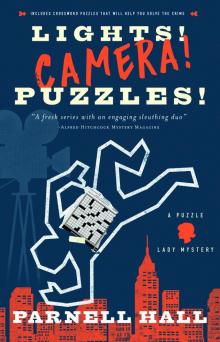 Lights! Camera! Puzzles!
Lights! Camera! Puzzles!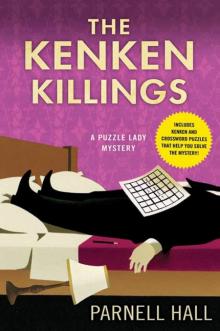 The KenKen Killings
The KenKen Killings 12-Scam
12-Scam The Puzzle Lady vs. the Sudoku Lady
The Puzzle Lady vs. the Sudoku Lady 2 Murder
2 Murder 7 Shot
7 Shot You Have the Right to Remain Puzzled
You Have the Right to Remain Puzzled Puzzled to Death
Puzzled to Death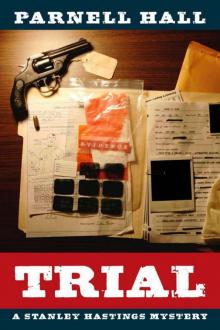 11-Trial
11-Trial The Witness Cat (Steve Winslow Mystery)
The Witness Cat (Steve Winslow Mystery) With This Puzzle, I Thee Kill
With This Puzzle, I Thee Kill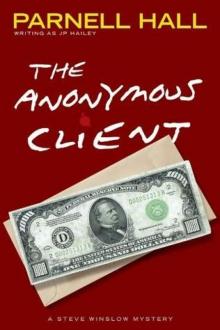 The Anonymous Client sw-2
The Anonymous Client sw-2 Death of a Vampire (Stanley Hastings Mystery, A Short Story)
Death of a Vampire (Stanley Hastings Mystery, A Short Story) The Wrong Gun sw-5
The Wrong Gun sw-5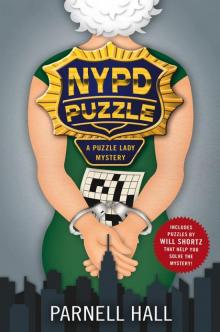 NYPD Puzzle
NYPD Puzzle 6 Juror
6 Juror 07-Shot
07-Shot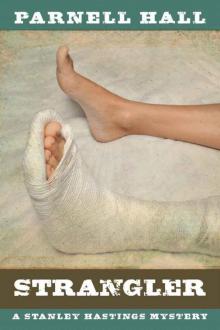 04-Strangler
04-Strangler 02-Murder
02-Murder SW04 - The Naked Typist
SW04 - The Naked Typist Actor
Actor The Naked Typist sw-4
The Naked Typist sw-4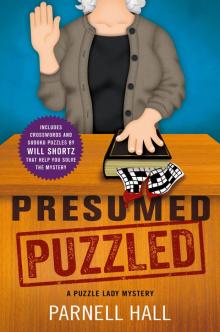 Presumed Puzzled
Presumed Puzzled SW01 - The Baxter Trust
SW01 - The Baxter Trust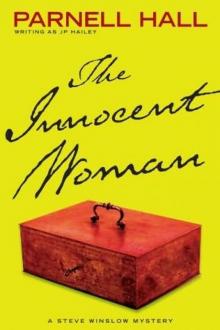 SW06 - The Innocent Woman
SW06 - The Innocent Woman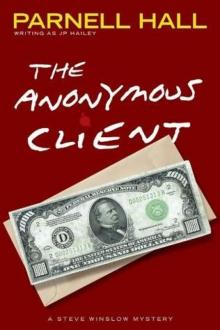 SW02 - The Anonymous Client
SW02 - The Anonymous Client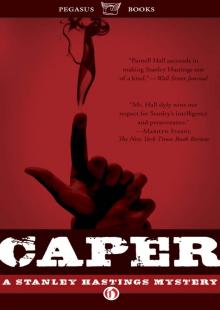 Caper
Caper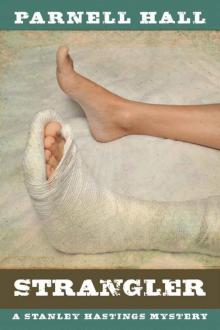 4 Strangler
4 Strangler The Underground Man sw-3
The Underground Man sw-3 Manslaughter (Stanley Hastings Mystery, #15)
Manslaughter (Stanley Hastings Mystery, #15) A Puzzle to Be Named Later--A Puzzle Lady Mystery
A Puzzle to Be Named Later--A Puzzle Lady Mystery 05-Client
05-Client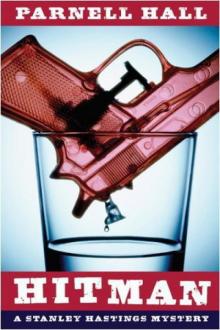 16 Hitman
16 Hitman SW05 - The Wrong Gun
SW05 - The Wrong Gun 3 Favor
3 Favor Last Puzzle & Testament
Last Puzzle & Testament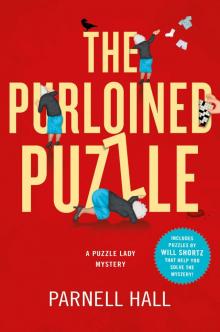 The Purloined Puzzle
The Purloined Puzzle 03-Favor
03-Favor SW03 -The Underground Man
SW03 -The Underground Man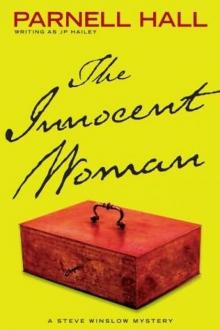 The Innocent Woman sw-6
The Innocent Woman sw-6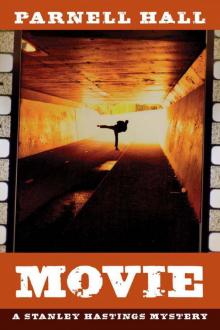 10 Movie
10 Movie 06-Juror
06-Juror Puzzled Indemnity
Puzzled Indemnity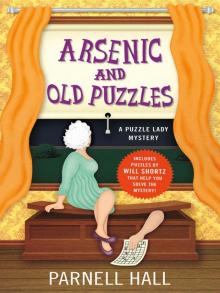 Arsenic and Old Puzzles
Arsenic and Old Puzzles Dead Man's Puzzle
Dead Man's Puzzle Safari
Safari $10,000 in Small, Unmarked Puzzles
$10,000 in Small, Unmarked Puzzles The Baxter Trust sw-1
The Baxter Trust sw-1 5 Client
5 Client Cozy (Stanley Hastings Mystery, #14)
Cozy (Stanley Hastings Mystery, #14)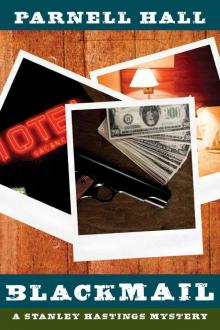 Blackmail
Blackmail A Puzzle in a Pear Tree
A Puzzle in a Pear Tree A Clue for the Puzzle Lady
A Clue for the Puzzle Lady Clicker Training (Stanley Hastings Mystery, A Short Story)
Clicker Training (Stanley Hastings Mystery, A Short Story)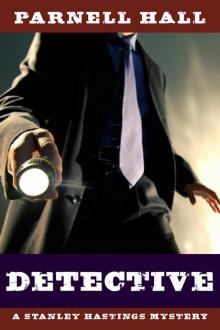 Detective (Stanley Hastings Mystery Book 1)
Detective (Stanley Hastings Mystery Book 1) 13 Suspense
13 Suspense